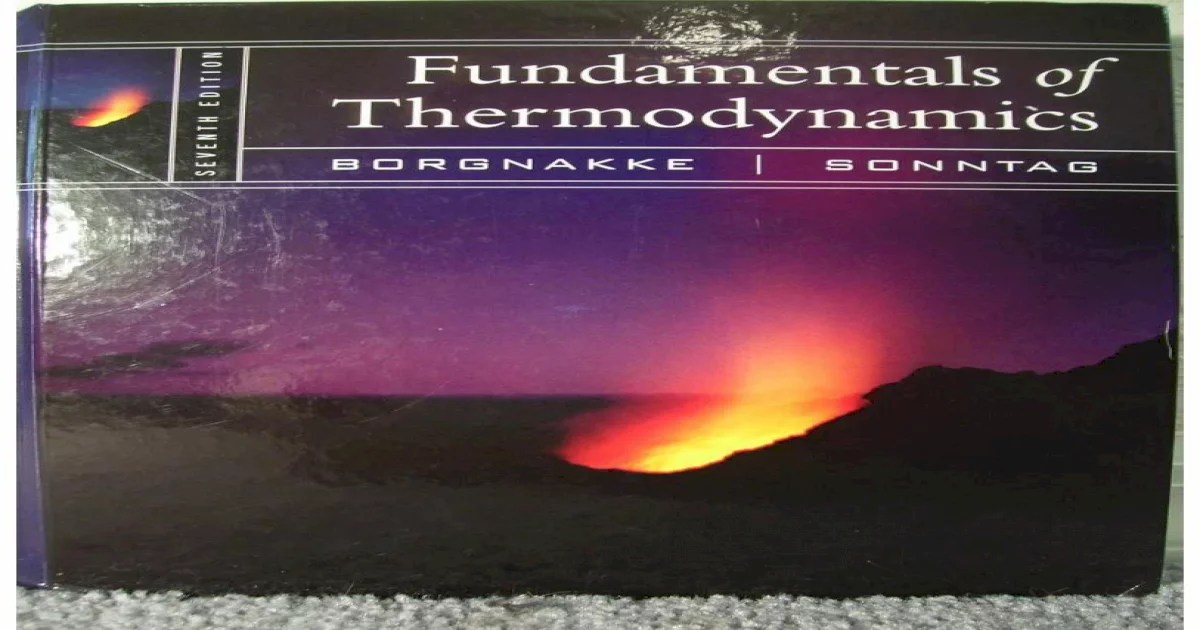Fundamentals of thermodynamics 7th edition – As Fundamentals of Thermodynamics, 7th Edition takes center stage, this opening passage beckons readers into a world crafted with meticulous precision, ensuring a reading experience that is both absorbing and distinctly original. Delving into the profound principles that govern energy and matter, this seminal work unveils the intricate workings of our physical universe, empowering students and practitioners alike with a comprehensive understanding of the subject.
Throughout its pages, this authoritative text explores the fundamental laws of thermodynamics, illuminating the concepts of energy conservation, entropy, and the elusive nature of absolute zero. It meticulously examines the properties of pure substances, unraveling the complexities of phase behavior and the thermodynamic characteristics of common materials.
Moreover, the book delves into the intricate realm of energy analysis, elucidating the concepts of internal energy, enthalpy, and their applications in diverse processes.
1. Laws of Thermodynamics

The laws of thermodynamics provide a fundamental framework for understanding the behavior of energy and matter in thermodynamic systems.
First Law of Thermodynamics
- Energy cannot be created or destroyed, only transferred or transformed.
- The change in internal energy of a system is equal to the difference between the heat added to the system and the work done by the system.
Second Law of Thermodynamics
- Entropy, a measure of disorder, always increases in a closed system.
- The entropy of an isolated system approaches a maximum value as the system approaches equilibrium.
Third Law of Thermodynamics
- The entropy of a perfect crystal at absolute zero is zero.
- Absolute zero is unattainable in practice.
2. Properties of Pure Substances
Pure substances are composed of a single chemical species and exhibit distinct properties that can be characterized using thermodynamic principles.
P-v-T Behavior
- The P-v-T behavior of a pure substance can be represented by an equation of state.
- The ideal gas law is a simplified equation of state that applies to gases at low pressures and high temperatures.
Phase Rule
- The phase rule relates the number of phases, components, and degrees of freedom in a system.
- The phase rule can be used to predict the behavior of systems undergoing phase transitions.
Thermodynamic Properties
- Common thermodynamic properties of pure substances include specific volume, specific heat, and entropy.
- These properties can be used to calculate changes in state and analyze system behavior.
3. Energy Analysis of Closed Systems

Closed systems are systems that do not exchange mass with their surroundings, allowing for the analysis of energy transfer and conversion.
Internal Energy and Enthalpy
- Internal energy is a measure of the total energy of a system, including kinetic and potential energy.
- Enthalpy is a measure of the energy available for work, equal to the sum of internal energy and the product of pressure and volume.
First Law of Thermodynamics for Closed Systems, Fundamentals of thermodynamics 7th edition
- The change in internal energy of a closed system is equal to the heat added to the system minus the work done by the system.
- This principle can be used to analyze energy transfer in processes such as combustion and heat transfer.
Applications of Energy Analysis
- Energy analysis is used to design and optimize systems for energy efficiency.
- Examples include power plants, heating and cooling systems, and chemical processes.
Key Questions Answered: Fundamentals Of Thermodynamics 7th Edition
What are the key concepts covered in Fundamentals of Thermodynamics, 7th Edition?
The text delves into the fundamental laws of thermodynamics, properties of pure substances, energy analysis, entropy and availability, power and refrigeration cycles, mixtures and solutions, and applications in engineering.
How does the book approach the study of thermodynamics?
Fundamentals of Thermodynamics, 7th Edition adopts a rigorous and comprehensive approach, presenting the subject matter with meticulous precision and clarity. It seamlessly blends theoretical foundations with practical applications, empowering readers with a deep understanding of the principles and their real-world implications.
What makes this edition of the book unique?
The 7th edition of Fundamentals of Thermodynamics has been meticulously updated and revised to reflect the latest advancements in the field. It incorporates cutting-edge research and insights, ensuring that readers are equipped with the most up-to-date knowledge and understanding of thermodynamics.